Johnstown Dentist Offices - Mono Implants Charleston WV
Johnstown Dentist Offices - Mono Implants Charleston WV
Blog Article
Dental Implant Alexandria OH - Get Your FREE Dental Implant Consultation NOW!
When determining what sort of anesthesia is used for dental implants, it becomes essential to discover numerous choices out there to patients. The alternative of anesthesia can significantly influence the comfort of the process, the overall expertise, and the pace of recovery. Dental Implant Hartford OH.
Local anesthesia is the most generally used kind for dental implant surgeries. In this methodology, an anesthetic agent is injected near the surgical website. Local anesthesia successfully numbs the targeted space, allowing the oral surgeon or dentist to carry out the process with minimal pain to the patient. It is useful as a result of sufferers remain absolutely awake and aware all through the method, fostering a sense of management.
Dental Implant Columbus OH - Oral Surgery
Sedation dentistry presents one other method for people who might feel anxious concerning the process. Sedation can range from delicate to deep, permitting patients to relax while their implants are positioned. Different levels of sedation can be achieved via oral sedatives, nitrous oxide, or intravenous methods. The degree of rest may be tailor-made to the specific needs or anxiousness ranges of the affected person.
Nitrous oxide, generally generally recognized as laughing fuel, is a popular choice for dental procedures, including implants. This form of sedation works quickly, allowing patients to really feel relaxed and euphoric. Administration is handy, because the gas is inhaled through a masks positioned over the nose. Patients can usually resume regular activities shortly after the process, making nitrous oxide a favourite among both dentists and patients.
Another option is oral sedation. This technique entails taking a prescribed sedative before the appointment. Patients usually really feel sleepy and less conscious of their surroundings whereas nonetheless being able to communicate with their dental team if necessary. While oral sedation is effective, its onset and length can range from person to person, so dentists should consider individual needs fastidiously.
Intravenous (IV) sedation presents deeper levels of sedation, best for longer or extra advanced procedures. This technique permits for speedy adjustment of sedation ranges, as the anesthetic is run directly into the bloodstream. Patients on this state could feel extraordinarily relaxed and might not keep in mind the process afterward. IV sedation sometimes requires a extra extensive recovery period compared to native anesthesia alone.
Dental Implant Condit OH - General and Restorative Dentistry
General anesthesia, though usually reserved for more invasive surgical procedures, can be considered for dental implants in particular conditions. This sort of anesthesia induces a state of complete unconsciousness, requiring close monitoring by an anesthesiologist. General anesthesia is suitable for sufferers with extreme anxiety, those that have problem sitting still for lengthy durations, or when multiple procedures are carried out simultaneously.
The selection of anesthesia may additionally depend on the affected person's medical history and any underlying medical conditions. Some illnesses could improve the risk of issues during anesthesia. Detailed discussions between the affected person and the dental team can result in a customized anesthetic plan that ensures security while enhancing comfort.
Many patients express concern concerning the unwanted effects related to anesthesia. While unwanted effects can vary news based mostly on the type used, most local anesthetics present minimal risks. Common considerations include short-term numbness and swelling close to the injection website. For those who opt for sedation, unwanted side effects could embody drowsiness, dizziness, or nausea.
Recovery time additionally plays a job within the selection of anesthesia. Local anesthesia typically allows for a faster recovery, enabling sufferers to resume normal activities inside hours. Sedation methods might require more time for the medication to put on off, necessitating arrangements for transportation post-procedure.
Dental Implant Granville OH - Dental Hygienist near Ohio

The significance of communication between the patient and the dental practitioner cannot be overstated. Sharing concerns and preferences allows for a tailored anesthetic method. A thorough analysis helps to determine probably the most acceptable sort of anesthesia to make sure each consolation and effectiveness through the dental implant procedure.
In addition to consolation and security, the general success of dental implants can additionally be influenced by the selection of anesthesia (Dental Implant Alexandria OH). The results of hysteria on the body can complicate surgical procedures and lengthen recovery occasions. Therefore, a proper anesthetic plan plays a crucial function in not only instant consolation but also the long-term success of the dental implants.
Dental Implant New Albany OH - Dental Care
Patients should be prepared to discuss their medical history, anxiety levels, and private preferences when consulting a dentist for dental implants. This open dialogue allows the practitioner to create an anesthetic technique that suits the person while guaranteeing the process runs smoothly and successfully.

The quest for a pain-free dental implant procedure could be daunting for lots of. The varying kinds of anesthesia create options that can match individual wants, existence, and comfort levels. The proper choice of anesthesia can flip a potentially annoying dental go to into a more manageable expertise.
Dental Implant Sunbury OH - Dental Services
In conclusion, understanding what type of anesthesia is used for dental implants is crucial for sufferers preparing for the procedure. From native to common anesthesia, each technique has its advantages and issues. With a big selection of options obtainable, patients can work closely with their dental staff to find out the most effective read the article method, enhancing not only consolation but in addition the probability of a successful outcome. Ultimately, the number of anesthesia directly impacts both the expertise during the process and the general satisfaction with dental implants.
- Local anesthesia is predominantly used for dental implants, providing targeted numbing to the surgical site while permitting the affected person to stay fully acutely aware.
- Common local anesthetics embrace lidocaine, articaine, and mepivacaine, every chosen for his or her effectiveness and duration of action.
- Sedation dentistry can also be employed for sufferers with anxiousness, often using average sedation strategies like nitrous oxide or oral sedatives.
- General anesthesia may be an option for complicated instances or in sufferers with severe anxiousness or particular needs, making certain a completely unconscious state.
- The selection of anesthesia is decided by the affected person's medical historical past, degree of anxiety, and complexity of the implant process.
- During the procedure, monitoring of vital signs ensures the affected person's security and luxury ranges are maintained.
- Post-surgery, patients are sometimes given directions concerning pain management, which can embrace over-the-counter pain relievers alongside instructed dosages of native anesthesia.
- The use of anesthetic brokers can vary based on individual responses, necessitating a tailored strategy from the dental professional.
- Some dental practices might supply virtual reality or distraction techniques to help patients manage anxiety alongside anesthesia options.undefinedWhat type of anesthesia is used for dental implants?
What is the commonest kind of anesthesia used for dental implants?undefinedThe most common type of anesthesia for dental implants is local anesthesia, specifically lidocaine. This numbs the surgical area to minimize pain through the procedure.
Can I request sedation for my dental implant surgery?undefinedYes, many dentists offer sedation options, corresponding to oral sedation or nitrous oxide, for patients who really feel anxious or favor a extra relaxed experience during dental implant surgery.
Dental Implant Johnstown OH - Oral Surgery

Will I be awake in the course of the dental implant procedure?undefinedIf local anesthesia is used, you will be awake but numb in the remedy space. If sedation is chosen, you could be in a light sleep and not absolutely aware of the procedure.
How long does the anesthesia last through the procedure?undefinedThe results of native anesthesia usually final for 1 to 3 hours, depending on the specific medication used. However, the period can differ primarily based on particular person components.
Dental Implant Condit OH - Dental Care

Are there any side effects of dental anesthesia?undefinedPossible unwanted facet effects can embody temporary numbness, swelling, bruising, and, in uncommon circumstances, allergic reactions. It's necessary to discuss any issues with your dentist beforehand.
Can I eat or drink after receiving anesthesia for my dental implant?undefinedIt's greatest to keep away from eating or consuming till the numbness has completely worn off to stop biting your tongue or cheek. Follow your dentist’s particular post-operative instructions for one of the best outcomes.
How is anesthesia administered for dental implants?undefinedLocal anesthesia is often administered via a small injection immediately into the gum tissue. Sedation choices may involve inhalation or oral medicine that can help you loosen up before the procedure.
Dental Implant New Albany OH - Dental Services
Do I want somebody to drive me home after the procedure?undefinedIf you’ve received sedation, it’s recommended to have someone drive you home, as you might feel groggy or disoriented. Local anesthesia alone often does not require assistance.
What if I truly have a worry of needles?undefinedIf you've a concern of needles, focus on this along with your dentist. They can present methods to assist ease your anxiety, similar to using topical numbing agents before the injection.
Report this page